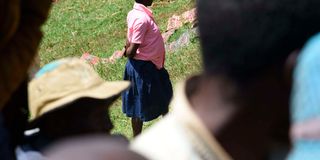Why are we still punishing girls for the crimes committed against them?

A pregnant school going girl. Whilst we examine girls for pregnancy, their predators walk free among us.
What you need to know:
- I discovered that the horrific practice my aunties endured 40 years ago—teachers physically examining girls for pregnancy—still continues today.
- I'm condemning a system that punishes pregnant children through expulsion and shame whilst protecting the older men who prey on them, perpetuating cycles of poverty and abuse.
- These vulnerable girls deserve unconditional love, protection and education instead of the systematic humiliation.
Forty years ago, I would sit quietly as my aunties recounted their return to school after holidays—how teachers would line them up for physical examinations, pressing hands against stomachs, checking for the evidence of pregnancies that might have occurred during their time away. Even as a child, I understood this was wrong, though I lacked the vocabulary to articulate why.
I genuinely believed we had buried this practice alongside other relics of our past. I was wrong.
The stories emerging from across our continent reveal that we've simply become better at hiding our cruelties, not eliminating them. Teachers still examine young girls' bodies. Schools still expel pregnant students. Families still cast out their daughters when pregnancies are discovered. The methods may have evolved, but the fundamental violation remains unchanged—we continue to punish children for the crimes committed against them.
Vulnerable child
What haunts me most is the realisation that these girls are often fleeing to rescue centres not because their families lack love, but because society has made loving a pregnant daughter an act of defiance. We've created a world where shame becomes so suffocating that mothers choose to send their children away rather than watch them endure daily humiliation. How did we arrive at a place where protecting a vulnerable child requires hiding her?
The perpetrators of these pregnancies walk freely amongst us—older men who prey on children's vulnerabilities, who exploit poverty and innocence with calculated precision. I wonder what conversations these men have with themselves in quiet moments. Do they sleep peacefully after destroying a child's future? Do they feel any accountability when they see young girls struggling with babies they're too young to understand? Or have they convinced themselves that children somehow invited their attention?
These men understand exactly what they're doing. They target girls from impoverished families because they know poverty silences voices. They know that desperate parents might stay quiet to preserve relationships that provide financial support. They know that pregnant children will be blamed whilst they remain protected by networks of enablers who would rather expel a child than confront an adult perpetrator.
But perhaps what disturbs me more than the predators themselves is the society that shields them. We've created elaborate systems to police girls' bodies whilst allowing the men who violate those bodies to escape scrutiny. We examine children for pregnancy but rarely interrogate the adults responsible. We expel victims from school but seldom pursue justice against their abusers.
The mathematics of this injustice is staggering. When we deny education to pregnant girls, we don't just steal their individual futures—we condemn their children to the same cycles of vulnerability. We ensure that poverty becomes hereditary, that abuse becomes intergenerational. Every expelled girl represents a family line potentially trapped in perpetual disadvantage.
I think about the teachers conducting these examinations and wonder what stories they tell themselves. Do they believe they're protecting other students? Maintaining standards? Or do they simply follow procedures without questioning the fundamental humanity of what they're doing? How do we explain to these educators that their hands become instruments of further trauma, that their actions compound rather than address the original violation?
The girls seeking shelter in rescue centres aren't problems requiring management—they're children requiring protection. They didn't choose their circumstances. They didn't invite the abuse that led to their pregnancies. They certainly didn't deserve the systematic humiliation that followed. Yet we've created a society that treats them as contaminants rather than casualties, as cautionary tales rather than children deserving care.
Protecting children
We speak endlessly about breaking cycles of poverty, but our actions reveal our hypocrisy. How can we claim to fight poverty whilst simultaneously denying education to its most vulnerable victims? How can we speak of protecting children whilst systematically punishing those who've already been harmed?
These girls deserve unconditional love, not conditional acceptance based on their sexual purity. They deserve protection from those who would exploit them, not punishment for having been exploited. They deserve access to education that might lift them from poverty, not expulsion that guarantees its continuation.
The practice my aunties endured four decades ago should have died with that generation. Instead, we've allowed it to evolve, to persist under different names but with identical cruelties.
We can do better. We must do better. These children are depending on us to finally get this right.


